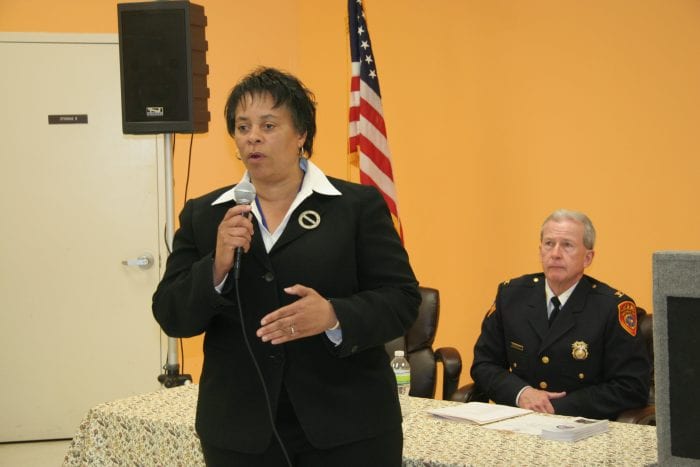Q&A With Deputy Police Commissioner on Recent Protests/Reforms

Risco Mention-Lewis, who has been a Deputy Police Commissioner since 2012, talked with TBR News Media about the recent protests on Long Island and about the relationship between the police and communities of color. The deputy commissioner supported the Constitutionally protected right to protest. Mention-Lewis was an assistant district attorney in Nassau County and has served as the first African American Deputy Police Commissioner in Suffolk County. In a wide-ranging interview, which is edited for space, Mention-Lewis offered her candid assessment of the civil unrest and the questions about police triggered by the killing of Minneapolis resident George Floyd at the end of May.
TBR: Have you spent time at the protests?
Mention-Lewis: I have not spent a lot of time at the protests. If I can’t [be there], I know somebody who knows somebody. It’s six degrees of separation. I run a support group for previously incarcerated [called Council of Thought and Action, or COTA]. A lot of the guys in that population are marching. Some of them are in the heads of the group, next to the person leading. I can reach out and see if I can have a dialog.
TBR: You did go to Mastic [on June 1]. What happened there?
Mention-Lewis: The young people needed a little conversation and guidance. I was there for 4.5 hours. My knees were so crimped that I couldn’t get into my car.
TBR: What did you do in Mastic?
Mention-Lewis: When they started getting a little out of control, jumping on the Sunrise [Highway], I thought if I could get on the ground and have a conversation, I could help them rethink the way they protest. There’s nothing wrong with protesting. America wouldn’t be here [if we didn’t protest].
TBR: What is your role in these protests?
Mention-Lewis: I’m the Deputy Police Commissioner. The way I look at it, the time we’re in is the time I was born for. My whole career has brought me to be who I am in this moment in time.
TBR: Can you offer some examples?
Mention-Lewis: All the things I’ve been doing my career are coming together. I’ve been talking about race my entire career. I’ve been talking about disparate treatment in criminal justice. [I have supported] more resources for previously incarcerated people and people of color my entire career. If we want to drive down crime, you have less reentry to do if you do more intervention. We’re focused on the back end, when we could do much more on the front end.
“People in Hauppauge don’t need a Department of Labor as much as people Wyandanch. Why not put resources where they are needed, where people don’t have cars?”
— Risco Mention-Lewis
TBR: What are some of the solutions on the front end?
Mention-Lewis: Police spend a lot of time in minority communities. They are learning to spend time in the community versus as an outsider. They are learning about the youth centers, resource centers. They are talking to those guys on the corner. When I first got here, I hung out on the corner more than I did anything else. I know that was weird. What is the Deputy Police Commissioner doing on the corner? That’s where you get your connections and your influence, getting to know people.
TBR: What sorts of resources do people need?
Mention-Lewis: Part of our job is to make information accessible, to make resources accessible. That’s why I work with [County Executive Steve] Bellone and [Babylon Town Supervisor Rich] Schaffer to make sure the resource center has what is needed in a resource center. If I have to travel two to 2.5 hours on a bus, I’m not getting that resume done. Go online? What if I don’t have Internet. What if I only have a laptop or a cell phone? The resource center needs to have computers. Some communities need a Department of Labor in the neighborhood.
TBR: Like where?
Mention-Lewis: It’s simple, common sense. People in Hauppauge don’t need a Department of Labor as much as people Wyandanch. Why not put resources where they are needed, where people don’t have cars?
TBR: Are protestors talking about any of this?
Mention-Lewis: A lot of protests are talking about [how they want] better. Okay, have you done the research?
TBR: Have the police been effective in making community connections?
Mention-Lewis: We’ve done a really good job of getting into our communities. It’s why we didn’t have incidents [during the over 100 protests]. We had people on bikes talking with people before the marches started.
TBR: Are the protests creating change?
Mention-Lewis: Humans navigating life in white skin have the privilege of not thinking about race, until now. However, because they have not thought about it, they often may not know how to think about it. I’m a practical person. I want resources in the community and also help the Police Department Command understand the framing in the moment.
TBR: Are African American residents skeptical of government resources?
Mention-Lewis: One of the largest things that the government and policing need to understand: because of the history of America, Black people, even if sometimes you bring the resources, [think] it’s a suspect resource. There’s the Tuskegee experiment [in which Black men with syphilis didn’t receive treatment, even when penicillin became the standard of care in 1947. The study continued until the press reported it, in 1972].
TBR: What’s the impact of the Tuskegee Experiment?
Mention-Lewis: There’s always this undercurrent of mistrust, and rightfully so. The Tuskegee experiment went into the early 1970s. We’re talking about recent impacts on Black communities. White communities are not aware all the time. When that body was found in Huntington, people think about lynching. The police may not know, but there are six across the country that Black people are paying attention to. If you don’t know the cultural context, it’s difficult to be having the conversation.
TBR: How do you create the cultural context?
Mention-Lewis: If there are suicides or murders, it [doesn’t matter] in the sense of cultural context. People are concerned, even if the police say they are all suicides. Even if the police say they are all suicides, people of color say, ‘we know they don’t always tell us the truth, especially when we die.’
TBR: What can help develop that cultural context?
Mention-Lewis: We talk to leadership. We talk to families. We have a press conference with all of us and not just the police. When we start thinking about cultural context, how do we communicate taking into account that cultural context? It’s the same with recruitment. We have a low number of African Americans in the police department. We have to talk about the 1,000 pound invisible elephant in the room.
TBR: What’s your focus in the Police Department?
Mention-Lewis: Criminal justice and driving down violence in communities.
TBR: How do you think Suffolk County has done in the police department?
Mention-Lewis: We are ahead of the game. We’ve been working with the Department of Justice for many years. The DOJ is saying we have one of the best implicit bias training programs. They asked us to teach the Ferguson [Missouri Police Department, where a white police officer killed Michael Brown in 2014]. We have been doing community relations in a different way for years. We know how to work with leadership, whether that’s minority, Muslim, Black, Jewish. We know to go to leadership in churches and synagogues to get and receive information to be culturally competent.
“We’ve been working with the Department of Justice for many years. The DOJ is saying we have one of the best implicit bias training programs.”
— Risco Mention-Lewis
TBR: What are you doing to improve the process?
Mention-Lewis: We are doing traffic stop data to look at whether the stops are fair and just. We are doing a community survey to ask how we are doing. How do you know unless you ask?
TBR: Who is looking at the traffic stop data?
Mention-Lewis: The Finn Institute.
TBR: What do you expect the Institute’s research on traffic stops will show?
Mention-Lewis: That we have work to do, but we’re willing to do it. Most data will always reveal you have work to do.
TBR: What is the methodology of the Finn study?
Mention-Lewis: With the data collection, the study will show when an officer stops a car, the race, date, time and location [of the traffic stop]. If we look at this person’s history, there might be an issue here that we can fine tune.
TBR: The results could show a range of responses, right?
Mention-Lewis: You give the rules, you test to see whether the rules are in place, then you retrain or you congratulate, depending on what’s going on.
TBR: Are you pleased that the SCPD is conducting this study?
Mention-Lewis: We are not perfect. What we have in place are systems to check the system. The community is checking us, too. The community is not just complaining to one another. They are making complaints to us.
TBR: Why isn’t the SCPD using body cameras?
Mention-Lewis: The biggest reason is the cost. It’s millions of dollars for the cameras plus the storage. It’s a great idea. We should have them, eventually. They are going to be across the United States.
TBR: What do you think of the justice system?
Mention-Lewis: We are moving in the right direction as a county. The courts should follow suit because we know with sentencing, statistically, nationally, there are issues. All this is, is an opportunity for every aspect of society to look in the mirror and say, ‘what can I do and what knowledge do I need to do my best effort?’
TBR: How do you think the police has responded to protests?
Mention-Lewis: We don’t say we are a community response unit. We are not looking to respond when something happens. That’s not our relationship with the community. We do community relations. We want to have a relationship year-round. When something happens, that’s not the first time you’re talking to us. Whatever community we’re in, we’re looking to be a part of the solution, working with the community to problem solve. We have people on bike patrol getting to know the protesters at every march.
TBR: Do you think people believe the police are protecting and serving them?
Mention-Lewis: There’s two cultures in policing: the warrior and the guardian. The warrior is what many departments have become. The guardian is what is being promoted as what we should be. Those are just words. How do our actions correspond with that? Black communities in particular have had more of a warrior treatment. How do we partner with the community to listen and deal with problems differently in those communities, effectively but differently?
TBR: Do the police serve the variety of communities effectively?
Mention-Lewis: You should be able to sit down with us and express what you feel we should have done differently. We should be willing to listen. It doesn’t mean you’re always going to walk away satisfied. We will try to figure out how to do it better.
TBR: Have protestors asking for anything unreasonable?
Mention-Lewis: The Mastic kids were asking for a youth center, or some place where they can have activities. That’s reasonable. They were asking for criminal justice reform. Okay, do your research so you know what that means. Be an educated protestor. I haven’t heard ‘defund the police.’ If someone says, ‘no racist police.’ We shouldn’t be offended by that. If they say, no f-ing police, that’s offensive. Some people want to yell in people’s faces unguarded. We have to deal with that as professionals. They are not yelling at us anyway. They are yelling at the officer on the Internet. We are carrying ourselves well through the process.
TBR: How is the police department doing in recruiting people from all communities?
Mention-Lewis: We worked hard with the community to recruit people of color. In the last recruitment class, 34 percent of the applicants identify as people of color. That hasn’t happened in the history of the department. Right now, there are 2 percent [African Americans] in the department. We’re not perfect, but we are doing the damn thing.
TBR: What are some of the easiest things to change?
Mention-Lewis: All departments should have implicit bias training. Across the country, I didn’t know this, we banned chokeholds 30 years ago and there’s still people doing it today. We need national standards for policing so that when people across the country have other rules, they don’t affect our reputation. We’re not perfect.






